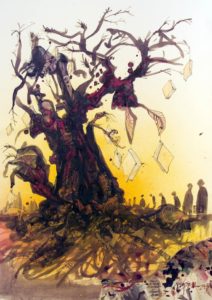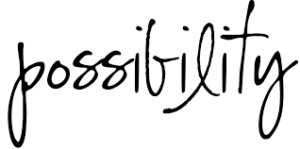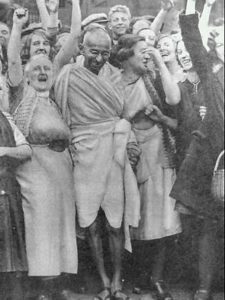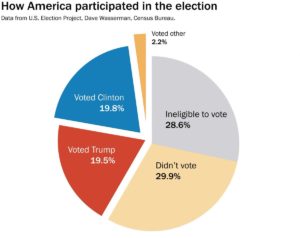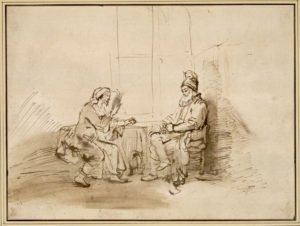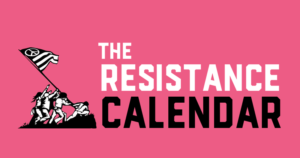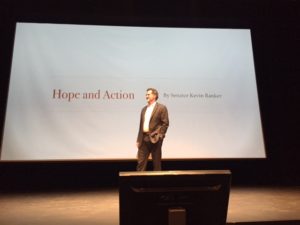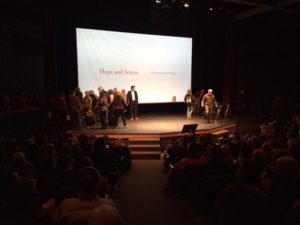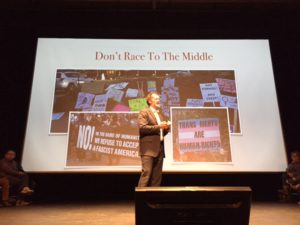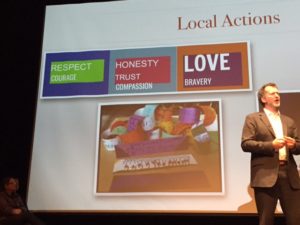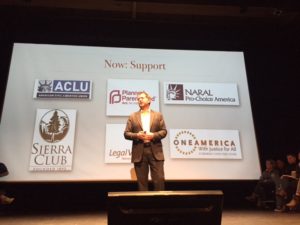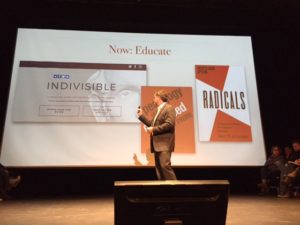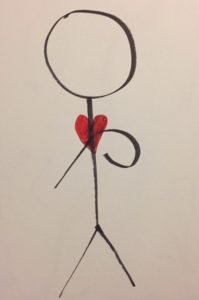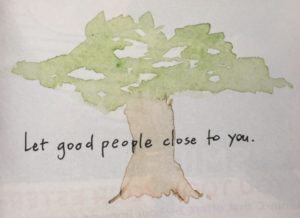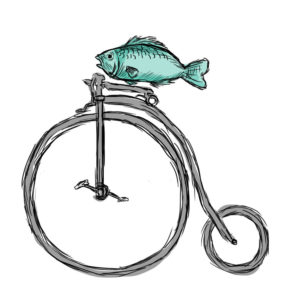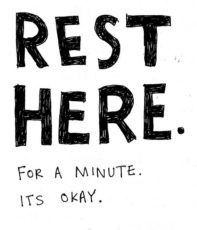Kindness.
February 25, 2017Before you know what kindness really is
you must lose things,
feel the future dissolve in a moment
like salt in a weakened broth.
What you held in your hand,
what you counted and carefully saved,
all this must go so you know
how desolate the landscape can be
between the regions of kindness.
How you ride and ride
thinking the bus will never stop,
the passengers eating maize and chicken
will stare out the window forever.
Before you learn the tender gravity of kindness,
you must travel where the Indian in a white poncho
lies dead by the side of the road.
You must see how this could be you,
how he too was someone
who journeyed through the night with plans
and the simple breath that kept him alive.
Before you know kindness as the deepest thing inside,
you must know sorrow as the other deepest thing.
You must wake up with sorrow.
You must speak to it till your voice
catches the thread of all sorrows
and you see the size of the cloth.
Then it is only kindness that makes sense anymore,
only kindness that ties your shoes
and sends you out into the day to mail letters and
purchase bread,
only kindness that raises its head
from the crowd of the world to say
it is I you have been looking for,
and then goes with you every where
like a shadow or a friend.
-Naomi Shihab Nye
On Dialogue
February 24, 2017[Ralph Steadman art]
In spite of this worldwide system of linkages, there is, at this very moment, a general feeling that communication is breaking down everywhere, on an unparalleled scale…what appears [in the media] is generally at best a collection of trivial and almost unrelated fragments, while at worst, it can often be a really harmful source of confusion and misinformation.
He terms this “the problem of communication” and writes:
Different groups … are not actually able to listen to each other. As a result, the very attempt to improve communication leads frequently to yet more confusion, and the consequent sense of frustration inclines people ever further toward aggression a and violence, rather than toward mutual understanding and trust.
More from Maria Papova/brainpickings and David Bohm:
“It is clear that if we are to live in harmony with ourselves and with nature, we need to be able to communicate freely in a creative movement in which no one permanently holds to or otherwise defends his own ideas.
Language is collective. Most of our basic assumptions come from our society, including all our assumptions about how society works, about what sort of person we are supposed to be, and about relationships, institutions, and so on. Therefore we need to pay attention to thought both individually and collectively.
“Dialogue” comes from the Greek word dialogos. Logos means “the word,” or in our case we would think of the “meaning of the word.” And dia means “through” — it doesn’t mean “two.” A dialogue can be among any number of people, not just two. Even one person can have a sense of dialogue within himself, if the spirit of the dialogue is present. The picture or image that this derivation suggests is of a stream of meaning flowing among and through us and between us. This will make possible a flow of meaning in the whole group, out of which may emerge some new understanding. It’s something new, which may not have been in the starting point at all. It’s something creative. And this shared meaning is the “glue” or “cement” that holds people and societies together.
Contrast this with the word “discussion,” which has the same root as “percussion” and “concussion.” It really means to break things up. It emphasizes the idea of analysis, where there may be many points of view, and where everybody is presenting a different one — analyzing and breaking up. That obviously has its value, but it is limited, and it will not get us very far beyond our various points of view. Discussion is almost like a ping-pong game, where people are batting the ideas back and forth and the object of the game is to win or to get points for yourself…
In a dialogue, however, nobody is trying to win. Everybody wins if anybody wins. There is a different sort of spirit to it. In a dialogue, there is no attempt to gain points, or to make your particular view prevail. Rather, whenever any mistake is discovered on the part of anybody, everybody gains. It’s a situation called win-win, whereas the other game is win-lose — if I win, you lose. But a dialogue is something more of a common participation, in which we are not playing a game against each other, but with each other. In a dialogue, everybody wins.”
‘We know truth when we see it.’
[Illustration by Ralph Steadman for Ray Bradbury’s ‘Fahrenheit 451.’]
“Character is higher than intellect. Thinking is the function. Living is the functionary… A great soul will be strong to live, as well as strong to think.”
Ralph Waldo Emerson
[A] great influence into the spirit of the scholar, is, the mind of the Past, — in whatever form, whether of literature, of art, of institutions, that mind is inscribed. Books are the best type of the influence of the past… The theory of books is noble. The scholar of the first age received into him the world around; brooded thereon; gave it the new arrangement of his own mind, and uttered it again… It was dead fact; now, it is quick thought. It can stand, and it can go. It now endures, it now flies, it now inspires. Precisely in proportion to the depth of mind from which it issued, so high does it soar, so long does it sing.
I do not see how any man can afford, for the sake of his nerves and his nap, to spare any action in which he can partake. It is pearls and rubies to his discourse. Drudgery, calamity, exasperation, want, are instructers in eloquence and wisdom. The true scholar grudges every opportunity of action past by, as a loss of power. It is the raw material out of which the intellect moulds her splendid products.
Character is higher than intellect. Thinking is the function. Living is the functionary. The stream retreats to its source. A great soul will be strong to live, as well as strong to think…’
-Emerson
More framer Cultural Ambassador Maria Papova/brainpickings:
One urgency at a time…
‘…till you remember that you are a blessed piece of spirit-dust in spirit-wind.
Now more than ever, you must breathe till your ounce of breath becomes the sky, again and again.’
-Mark Nepo
Infinite presence.
February 23, 2017‘We are on the verge of possibility. The individual or nation without a vision must perish until the vision is reborn.
What is our vision going to be in the midst of confusion, doubt, and uncertainty? It is either going to fall before the confusion and be destroyed, or something transcendent within us is going to rise and look to a certain future, to an eternal Reality, to a god-principle – – to an Infinite Presence, responding to us according to our acceptance.
There is no individual good. Good belongs to everyone. Good fulfills itself only as it multiplies itself; therefore, there is no good that belongs to you and to me alone, not final peace to us only as individuals.
The watchword is not exclusion but inclusion, and the more good we release, the more good we experience.’
-Science of Mind
‘…how things were.’
“You may have expected that enlightenment would come like zap! Instantaneous and permanent. This is unlikely. After the first ‘aha,’ it can be thought of as the thinning of a layer of clouds.”
-Ram Dass
Every pilgrim on a journey feels the exhilaration and glow of being liberated. Then, as the work of the new world becomes real and trying, there arises a want to go back to where we lived before awakening. Because in the challenge of growing, we can feel, “Oh, God, this is too hard. I just want to go back to before I was aware.”
Even we we give ourselves completely to life’s journey, there’s always a dweller on the threshold, trying to distract us from what matters, just as we arrive. Like those among the Jews who, after leaving Egypt and experienced freedom, went to Moses to say, “We really hate the desert. What do you say we go back? Sure, we were slaves but it was clean and were fed. It wasn’t so bad, was it?”
This undertow of consciousness is understandable and inevitable. Life always seems to progress by the expansion of revelation and the contraction of hard work.
As we awaken more deeply into the pilgrimage of the heart, there are always new things to lift and new things to build. It’s not just, “Oh, we’re awake! Isn’t everything wonderful?” The path of wakefulness is rugged and slippery every step of the way.
As we negotiate the real work of staying awake, we need to be vigilant with the pilgrim in us who wants to move forward and kind with the fearful one in us who wants to go back. For all I’ve learned, for all my wakefulness and sensitivity, for all the turns in my journey, there’s always a small voice in me ready to say, “Let’s go back. It’s easier to hide.”
This is a crooked path to enlightenment: two steps forward, one step back; two days of being heartened, one day of being disheartened. This is the dynamic of being alive. This is what we work with and for.
-Mark Nepo
#resist
#persist
#love
Be the peace.
Science of Mind
“Gandhi said, ‘Be the change you want to see in the world.’ Let’s use that same formula and say, ‘Be the peace you want to see in the world.’ When we are the peace in the midst of the turmoil, we open up to receive the gifts of the Spirit.
In this peace we are divine instruments through which the all good of God flows to us, through us, and as us.”
Blurring reality.
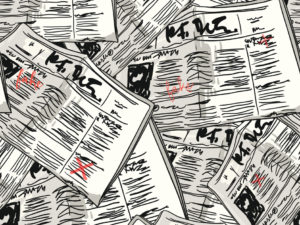
The term ‘Fake News’ blurs reality as language silos meaning and use. The question becomes, how do we communicate generally if terms and phrases hold different meaning depending on political perspective and ideology?
Words that resonate.
‘Our worldview casts a shadow in the words that resonate.
One reason it’s difficult to understand each other is that behind the words we use are the worldviews, the emotions and the beliefs we have before we even consider what’s being said.
Before we get to right and wrong, good or bad, effective or ineffective, we begin with worldview.
They affect the way we choose a car, engage in a conversation or vote. These cultural and learned worldviews alter the way we see and hear and speak.
Words like: Fairness, change, interference, freedom, responsibility and opportunity trigger different reactions based on worldview. It’s always easier to encourage action based on an existing worldview than it is to change that view.
The columns below don’t line up for everyone (or anyone), but instead highlight different instincts on different axes on how each of us see the world in any given moment…
| An all-powerful authority | Treat others as you’d want to be treated |
| Confidence, results, right now, right later |
Exploration, truth, working toward perfect, always a little wrong |
| Self-respect, power, agency, taking space |
Role awareness, dignity, giving space, flexibility |
| Deserve, entitled, keep | Share, distribute, invest |
| Effects | Side effects |
| Ends and means | Means and ends |
| Getting things done | Listening, speaking up and being heard |
| Patriotism, nationalism, the homeland |
Community, ecology, the system |
| Power, authority, compliance, respect, status | Fairness, hope, justice, connection, healing |
| Profit-seeking | Public utility |
| Intuitive | Informed |
| Realism, denial | Optimism, pessimism |
| Rewards, incentives, victory, spoils |
Equity, fairness and the alleviation of suffering |
| Urgency, triumph, security, impulse |
Self control, long-term thinking, wisdom |
| Vengeance | Forgiveness |
| Zero-sum | Win-win |
Once we understand the landscape that someone sees, we have an easier time using words and images to fill in that landscape, to create a story that they can hear and understand, and, perhaps, we can make change happen.’
-Seth Godin
The Truth is that which is.
‘It is more useful to realize that we each carry a Jesus and a Nicodemus within us; that is, we each have a divine inner voice that opens us to truth and a mediating social voice that is reluctant to show its truth to others.
…quiet pain comes from not honoring what we know to be true, even if all we know to be true are the questions we are asking.
True and False Self (D. W. Winnicott) – – it is the True Self that lets us know what is authentic and what has become artificial, while the False Self is a diplomat of distrust, enforcing a lifestyle of guardedness, secrecy, and complaint.
In everyday terms this means that each time we experience a change in reality as we know it, we must choose whether to declare or hide what we know to be true. At such moments we either need to bring the way we have been living into accord with that shift of reality, or we need to resist the change […] having to admit that what was essential is no longer essential and then needing to summon the courage to make the act of living essential again.’
-Mark Nepo
We press play. Not pause.
Grassroots meetings and rallies are organizing around the country…community by community…like this one on the San Juan Islands today [2.19.17]. Washington State Senator Kevin Ranker spoke to citizens who want to know what to do now. Who are ready for action and remain hopeful in these days of ‘45’. We want to protect and encourage human rights, not party rights. We are hopeful, and want to take action.
So many people showed up at this meeting today that to comply with fire safety rules, chairs were set up on stage to get folks out of the aisles.
This talk was focused on now. What can we do now.
‘We have to talk about liberating minds as well as liberating society.’ -Angela Davis
The focus of the talk was to keep our country’s core values strong, and to always lead first with love, kindness, and respect.
And we must listen to those who are hurting the most. Yes, our rural citizens need jobs, and all people must be given the right to vote – – these are big issues. Sometimes these larger issues seem overwhelming and impossible when we are daily barraged with backward and hurtful mandates this administration continues to release. Senator Ranker believes the power lies with the states and the people within our states. “States matter.” We must sign up and lobby for what we believe, and most importantly, we get people to vote; even in the context of re-districting and gerrymandering, help people vote. Looking at specific numbers, ‘45’ did not win by a large margin in any demographic. However, many people chose not to vote this election for various reasons. This meeting today was not about why, but what. What can we do now.
Senator Rankor offers three suggestions:
- One Term. We cannot allow eight years of hate. One term. One.
- Educate. Educate ourselves and others on the issues.
- Sign up.
Yes, our rural neighbors need jobs, and many voted for ‘45’ who felt he would get their jobs back in coal and manufacturing. These jobs have been dissipating since the ‘70’s and they’re not coming back – – technology has surpassed the need. Yet, there are industries that are growing, for example, the green industry. These families need opportunities for education. What can we do in our communities to help them? I encourage you to watch three brief reports offered from Frontline on PBS, released this week, that help explain the rural plight. Here are the links.
http://www.pbs.org/wgbh/frontline/article/betting-on-trump-jobs/
http://www.pbs.org/wgbh/frontline/article/betting-on-trump-coal/
http://www.pbs.org/wgbh/frontline/article/betting-on-trump-water/
Our collective hearts break thinking of the disappointment, the discouragement and despair when promises made during the campaign will not be kept – – when jobs do not return.
Choose the organizations to support that align with your beliefs and interests. And educate yourself and families. Go to https://www.indivisibleguide.com and learn how to organize action locally. Read books at your local libraries and book stores, like Paulo Freire’s, Pedagogy of the Oppressed, and Radicals, by Saul Alinsky. Sign up to make phone calls, right from your own homes, or local venues. Talk to people. Face-to-face. Listen. And write letters to Washington DC. Elected officials, according to Senator Rankin, read the hand-written ones.
Most importantly. We must stay strong. When we feel fatigued and overwhelmed, lean on each other in our groups for support and strength. And take time with each other, regardless of political perspective.
And you know what else we can do? Run for a political office, or local school board, or PTA. Lend our our voices, and always, always, our hearts.
I am inspired by this movement across our country. You care. I care. We care.
We can do this.
#persist
#resist
#love
Gilgamesh ’45’
In the Assyrian tale of Gilgamesh, over seven thousand years old, the lost and empty king doesn’t listen to the pain in his heart and so mistakenly declares war on Nature, projecting his pain as something to be conquered in the world.
How many times do we project our pain onto the world, rather than face the emptiness in our heart? How many times have we all been given a sign of what might help us find our way only to smash the sign, out of grief, impatience, or anger?
Projecting our pain, grief, impatience, and anger on others, abdicating our gifts to please a loved one, rejecting new learning because it challenges what is familiar, exiling others because they threaten our position or identity, and denying difficulty in hopes that it will go away – – these are all form of not listening that can undermine our aliveness in any given moment.
-Mark Nepo
Washington Post
All would be well, he said, so long as the people made sure always to elect political leaders who were “wise and good.”
By the time we reach ancient Greece, philosophers like Plato start to offer formal definitions of the tyrannical soul, and the picture is one of the person who defrauds freely, takes violently, lies consistently, robs and kills. Think of ’45’ saying last year about terrorism suspects, “You have to take out their families.” Think of his remark, “I could stand in the middle of Fifth Avenue and shoot somebody, and I wouldn’t lose any voters.”
For many years, I’ve taught Plato’s “Gorgias” and “Republic,” where the tyrannical soul is described. Never did I think we would have a walking, talking example from American politics in front of us 24-7. But here we are. I don’t invoke ’45’ when we discuss passages about the tyrant in those texts. But the comparisons are so obvious that after class my students tend to make small, quiet remarks to me about it.
While the institutions of constitutional democracy were invented to make it easier to rein people in, those who did the work of drafting the Constitution never thought that institutions alone could solve the job. On the cusp of the Constitution’s ratification, founder James Wilson paused to ponder what it would take for the reorganized representative democracy to succeed. All would be well, he said, so long as the people made sure always to elect political leaders who were “wise and good.” The president and other elected officials, he pointed out, would populate the bureaucracies of the new nation. If they themselves were wise and good, they would also populate all the offices of the country with the wise and good. If they were not, then corruption would spread through the entire system.
This election has moved past questions of ideology and partisan position to fundamental elements of the human condition, elements so fundamental that we can find them recorded in the earliest human texts. From the beginning of human history, when tyrannical souls have acquired power, the people have found themselves groaning and crying out with laments under the burden of it.
Character matters because it is how we restrain the inner would-be tyrant in each one of us. It matters because it is how we limit the placement of great power in the hands of those with tyrannical instincts and appetites. If we’ve given up a commitment to character, we’ve already given up the game or, to speak more precisely, the work of protecting freedom, equality and human flourishing.
-Danielle Allen/Political Theorist at Harvard University
All is love.
February 18, 2017Truth is of the people
By the people
For the people.
︶⁀°• •° ⁀︶
I believe that we are waking up from the spell
That those that profit from the fear
Cast so well
And good people of the earth now can tell
There is no us and them
If not now, when
If not today then
What happens tomorrow
All is love
All is choice
Everyone and every voice
All of life that you see
All are possibilities
As above so below
To wed the sense into the soul
This is truth
I believe
I believe
I believe
-Melissa Etheridge
Fixing a broken news industry.
February 17, 2017Lara Setrakian/Syria Deeply:
Trust in the media has hit an all-time low; we’re inundated with sensationalist stories, and consistent, high-quality reporting is scarce. She shares three ways we can fix the news and make the complex issues of our time easier to understand.
- Deep reporting/deep domain knowledge
- Journalistic Hippocratic Oath – ‘Do No Harm’
- Embrace complexity…not simplicity. It is a complex world.
[Most importantly, profits and corporate ownership need to be eliminated from journalism and broadcast media. Our country needs to reinstate a true Fourth Estate, the backbone of democracy, i.e., more grassroots media organizations who deep report, take the oath, and embrace complexity.]
Power & Reason
A fish is not like a bicycle, but they’re not mutually exclusive. You can have both.
Part of our culture admires reason. It celebrates learning. It seeks out logic and coherence and an understanding of the how and the why.
At the same time, there are other people who seek out influence and authority. Either to exercise it or to blindly follow it.
Sometimes, they overlap. Sometimes, power is guided by reason. But that’s not required, not in the short run. And sometimes, reasonable, informed people wield power. But again, as a visit to a university’s English department will show, not always.
It’s tempting for the powerful to argue with those that admire reason, pointing out how much power they wield.
And it’s tempting for the well-informed to argue with those that have power, pointing out how little reason they possess.
But just as a fish isn’t going to stop you from riding a bicycle, these arguments rarely work, because power and reason don’t live on the same axis. Listening to someone argue from the other axis is a little like watching TV with the sound off. It might look normal, but it is hard to follow.
Before we engage, we need to agree on what’s being discussed.
-Seth Godin


